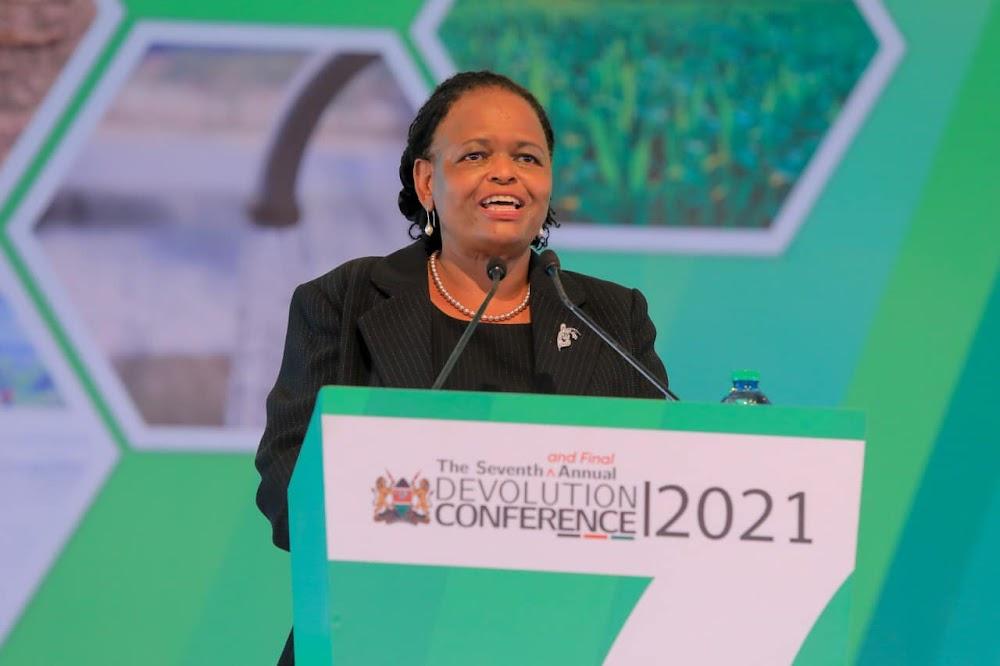Africa-Press – Kenya. On May 21, 2021, Martha Koome was sworn in as the Chief Justice of Kenya, becoming the first female CJ in the country since independence.
Her oath of office came during the era of President Uhuru Kenyatta, who has severally differed with the Judiciary on a number of issues including disobedience of court orders.
Koome took over the office from her predecessor David Maraga, whose term came to an end in 2020.
Her appointment came at a time when the Executive and the Judiciary were not sailing in the same boat, and a lot had not been resolved and all eyes were on her.
Before Maraga left office, he advised the president to dissolve Parliament for failing to enact legislation required to implement the two-thirds gender rule.
In what he termed as his constitutional duty to advise the president, Maraga said the move was prompted by six petitions seeking his advice on the matter.
Even so, the president, who had previously differed with the same CJ by then was expected to ignore the advice, which aroused a heated debate in the country.
Another big matter that had been pending during Koome’s predecessor’s term was the appointment of the recommended 41 persons as Judges of various courts.
JSC had recommended the appointment of the judges on August 14, 2019, but the president declined to make the appointments, with the failure variously justified as due to integrity concerns against some of the persons.
According to the law, upon JSC’s recommendation, the president is obligated to gazette the names without changing them or omitting any. The JSC also cannot withdraw any names after recommendation.
However, months after Maraga left office, the president appointed 34 judges, leaving out six, including George Odunga, Joel Ngungi, Aggrey Muchelule, and Weldon Korir.
The decline to appoint the six judges angered the Law Society of Kenya as well as Maraga and former CJ Willy Mutunga, who said the president was acting against the law.
Koome also expressed her concern to the president for not appointing all judges, but her remarks were chided by some of senior counsels, saying that she should have compelled the president to follow the law rather than being ‘soft’ to him.
Uhuru’s move irked Mutunga, who called for judges to strike following the Executive’s disobedience of court orders.
Koome, in a statement, urged judges to focus on progressive reforms to reduce the case backlog and not to yield to Mutunga’s call.
“I have, with tremendous respect, expressed my deepest disapproval personally to the retired Chief Justice and restate herewith to the people of Kenya that my foremost obligation is to defend the tenets of Judicial Authority espoused under Article 159 of the Constitution. Justice shall be done to all and without delay,” Koome said.
The issue of the Executive being branded as disobedient to the court orders has not been fully addressed up to date, months to the end of Uhuru’s regime.
When the CJ took office, president Uhuru asked the courts to avoid creating tension between him and Chief Justice.
Through lawyer Waweru Gatonye, Uhuru said in November that the power to appoint judges only lies with him. He said the judges of the High Court failed to appreciate the essence of separation of powers.
He told Court of Appeal judges Roselyn Nambuye, Wanjiru Karanja, and Imaana Laibuta that the High Court’s decision has taken away the constitutional power to appoint judges and given it to another organ, which power it does not have.
In October, High Court judges William Musyoka, James Wakiaga, and George Dulu directed Uhuru to appoint the rejected six judges within 14 days. The 14 days expired on November 4.
According to the directive, once the 14 days elapse without Uhuru having made the appointment, the bench said ‘it shall be presumed that his power to make them has expired and his office becomes powerless so far as the appointments are concerned.
Regardless of the High Court’s directive, the CJ said she would be appealing against a decision by the High Court.
In a notice of appeal, the CJ said that she was dissatisfied with the entire judgment of the High Court and intends to appeal against it.
Through Lawyer Waweru Gatonye, Uhuru said the decision and orders of the High court, have the potential effect of creating a conflict between the office of the Chief Justice and the office of the President of Kenya.
“I am aggrieved with the whole decision and have since filed and served a notice of appeal. Unless the decision and orders of the High court are suspended, the intended appeal will be rendered useless,” read the court documents.
BBI
Both the High Court and the Court of Appeal termed the Constitutional Amendment Bill 2020 as unconstitutional, null and void, a move that also worsen the relationship between the Executive and the Judiciary.
The BBI case will be heard for three consecutive days from January 18, 2022, at the Supreme Court on its legality.
Recently, the CJ said that she will be working closely with the Executive to weed out corrupt members of the Judiciary.
The CJ said that corruption or the perception of it in the Judiciary strips the institution of judicial hygiene thereby exposing the Constitution to mutilation and the country to anarchic takeover by cartels.
“Abandoning the principle of impartiality in decision making through corruption significantly obstructs the enjoyment of basic human rights.
“Favouring personal interests, fundamentally hinders the safeguarding duty of the public interest” Koome said.
For More News And Analysis About Kenya Follow Africa-Press






